Ravi Zacharias has spent the past 45 years commending the Christian faith and addressing life’s great existential questions of origin, meaning, morality, and destiny with eloquence and grace. Ravi is an Indian-born, Canadian-American, Christian evangelist who uses the teaching method of apologetics – a reasoned method of defending the faith – to take the Christian message to millions of people around the world. Ravi is not a pastor and does not have a church, but he evangelizes for the Christian faith in other, innovative ways.
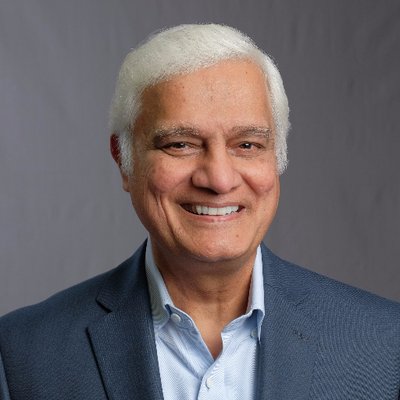
We were honored to have him join us on Episode 62 of the Agents of Innovation podcast to talk about his role as an author of more than 25 books and the growth of his nonprofit organization, Ravi Zacharias International Ministries (RZIM). Today, RZIM is located near Atlanta, Georgia, where he lives and works. RZIM has over 260 employees working from 16 countries around the world. Ravi himself has spoken in 70 countries on six continents.
Channeling the English essayist F.W. Boreham, Ravi says: “faith is like hidden gold, we sometimes find it in a place we least expect to even have it at that time.”
“We are all creatures of faith, all of us, we step onto a plane, you step into a cab, you sit on a chair, there is the element of trust in there,” said Zacharias. “The important thing to know about faith is: have you the reason for the faith you’re expressing?”
“When I found my trust in the person of Jesus Christ I had to reason my way through it,” he said. “I wanted to make sure, like the chair that I was sitting on, that I was leaning on it with my full weight and the chair had the reasonableness to be depended upon as it were.”
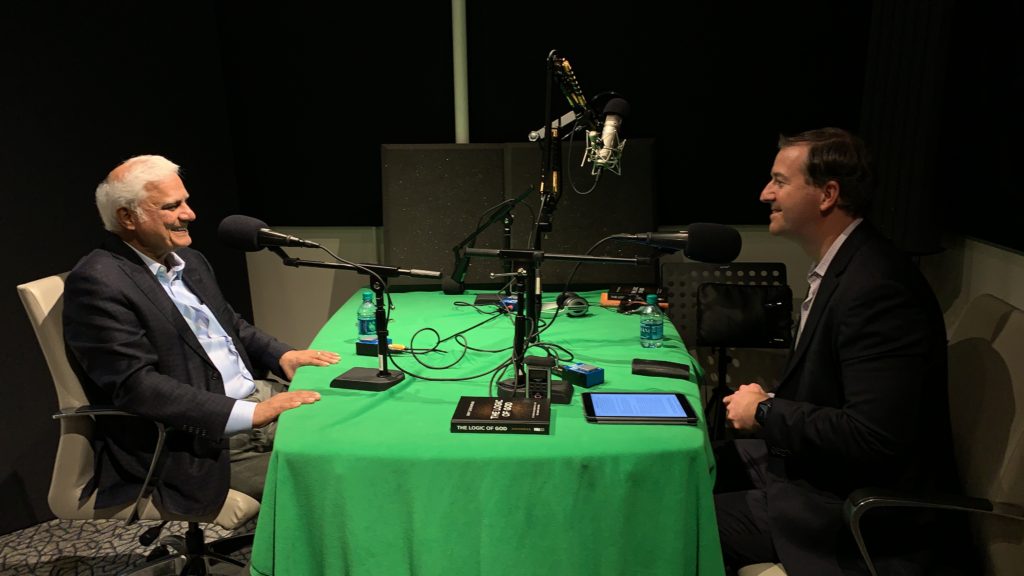
Today RZIM helps people use reason to build upon their faith. But Ravi’s faith didn’t come easily. As a young person, he was a skeptic and he was a troubled young man.
“When I found my faith in Christ it was in a crisis moment in my life. I had tried to take my own life as a teenager in India and that began my journey and that then shaped everything. Who you believe in, in terms of your ultimate worth, and your ultimate purpose, ultimately shapes what you immediately do or ultimately plan to do with your life.”
Ravi talked to us about how when he was a young person in India, growing up in a highly competitive culture, failure brings shame. “I was not succeeding the way I wanted to … and when failure came … I figured I want to make an exit in this life … little realizing what God had put into me. I had never even thought of that. God put certain capacities in each one of us. I didn’t realize at that time that probably the gift of language, of conceptual thinking, of argument and all of that was what he had poured into my life.”
Ravi’s father was a speechmaker, his grandfather a professor, and his great-grandfather was an attorney (a barrister, as they call it in India). The gift of speaking, of making a case verbally was certainly a gift he had in his family. But he didn’t see that immediately.
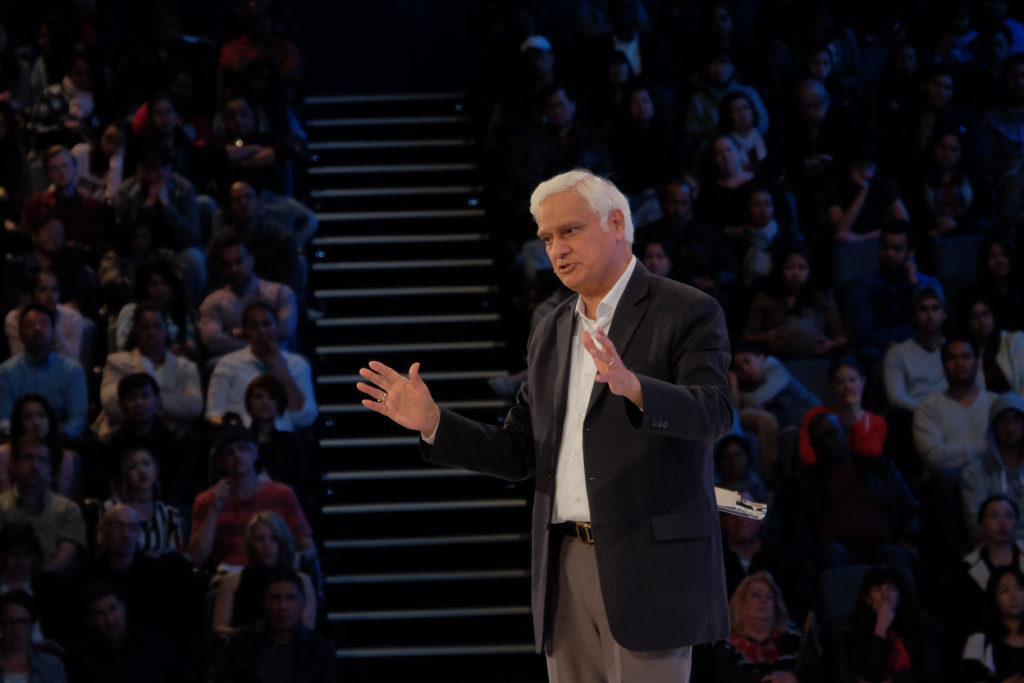
“When I tried to take my life, it was to escape shame,” he said. After that suicide attempt at the age of 17, Ravi cried out in desperation and called upon Jesus to be the shepherd of his soul, the guide of his life, and the beacon he would follow. It was a complete shift in his life and in his thinking. “All of a sudden all of your values are trans-positioned,” he said.
Ravi moved to Canada at the age of 20, to study business, with the ultimate goal of getting into Cornell. But while he was working towards that, he also started taking courses at a nearby seminary. “I just loved the Word of God. I loved the disciplines of theological thinking. I wanted to know how the Bible came to us,” he said. “So, I gave he gave up my pursuit in business, and went into theological training and the rest became history.”
In 1968, at the age of 22, he went into theological training in Toronto. Then, in the early 1970s, he traveled to Vietnam during the war, to minister to soldiers.
“That shaped my life,” he remembers. “As a young man when you’re thrown into a war zone, you’re naïve. Now I realize why those who come back from the thick of war are traumatized. You see things you don’t want to see that early in life,” he said. “It shaped my life that the depravity of the human heart is very real and when violence enters into the scene, destruction is always all around you.”
In 1974, he entered Cambodia just before the genocide of about 2 million people there over the next few years. Two of his interpreters were brutally killed after the Khmer Rouge took over.
“That shaped my thinking into being in the areas of need and trying to shape society differently with the Word of God. What could one life do to make a difference? But it can do a lot. And if everyone would take that responsibility, we can honor God and make it a different world.”
While today he says that “it was all a blur at that time,” clearly it was formative to his life and what he would do with his time on earth. He returned back to Canada from Vietnam and Cambodia when he was 25 years old; he graduated from theological studies when he was 26; he took a gap year to do evangelism; and then he went on to do graduate work at Trinity in Deerfield, Illinois.
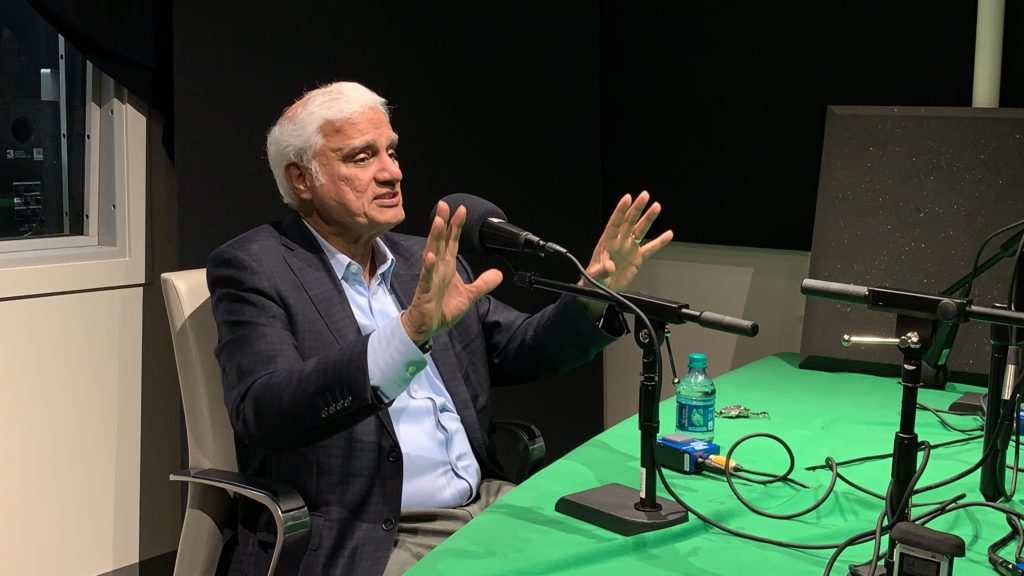
Many followers of Ravi Zacharias might describe him as an apologist (defender of the faith), but he describes himself as “an evangelist. That’s what I was appointed to do.” And he says that “apologetics is the seasoning and the sprinkling that we use.”
“Apologetics is given to us in scripture: to give an answer to those who are asking legitimate questions,” said Zacharias. “Evangelism is not just proclamation; it is proclamation with an understanding of what the obstacles are, what the resistances are. It’s understanding what the reasoning is behind those that reject it. And if you understand the opponent well, you will respond to the opponent wisely. I don’t see the opponent as an enemy to the faith. I see the opponent as an apologist for what he or she believes. And when you dialogue reasonably with them and they see the coherence of the teaching of Jesus Christ – it’s not about him or her versus me or somebody else. It’s the case of the answers of Jesus to the questions of humanity. And what I think: no one answers the questions of humanity of the way Jesus did and does.”
Ravi has answered a call to his own mission in life and to provide the answers to those with their own questions. “As an evangelist, apologist, I have the privilege of talking to people about the greatest diagnostician whoever lived because he’s the Lord of the universe and how he changes not only what we do but what we want to do.”
In 1983, at the age of 37, Ravi was an associate professor at the Alliance Theological Seminary in Nyack, New York. It was also that year that he spoke at a Billy Graham conference in Amsterdam. “That changed my life … one of the most important things [Billy Graham] did was inspire younger evangelists and I was in the younger category at that time.”
Ravi noticed that evangelism at the time was mostly directed at people whose lives had fallen apart, “the unhappy pagan,” as he put it. “So, the question in my mind was: who is speaking to the happy pagan? Who’s speaking to the person who is a naturalist, who lives for this world in a secular sense, as if there’s no tomorrow, but wants to lead an ethical life, who doesn’t feel his or her life falling apart, but still has the questions unanswered?”
“The central feature of sorrow is unanswered questions,” said Zacharias. “I wanted to be the evangelist who would deal with those who were asking genuine questions and actually believed that there were no answers.”

In 1984, he founded Ravi Zacharias International Ministries. He originally did not want to name it after himself, but his many supporters encouraged him to do this. But with a name, it also gave him the responsibility to lead. And lead it he has done for the past 35 years. “The responsibility [of leading RZIM] has become much bigger than I ever thought it would be. I don’t have the broad enough shoulders to carry this.”
His original supporter, D.D. Davis of Youngstown, Ohio, helped him start it, fund it, and over time many other supporters from all around the world have helped him sustain and grow the organization, which is more like a ministry, yet not quite a church. They focus on evangelism, apologetics, spiritual discipline, training, as well as humanitarian support. In addition to his public speaking appearances and conferences, RZIM also uses multimedia such as video and audio to get the message to people around the world. The Agents of Innovation podcast interview with Ravi Zacharias was recorded in RZIM’s in-house studio.
“Starting this was a vision to have a multiplicity of voices from a plurality of cultures based in different settings, with the same message … on the uniqueness of Jesus Christ in history,” said Zacharias. “What you’ve got is an audience listening and saying: ‘I need to take this seriously.’ These are people from diverse backgrounds, diverse education, diverse culture, but all focused on the person and the work of Jesus Christ. It gives an impetus for a listener to say: ‘something in here.’ I think if the world is truly looking for unity and diversity, RZIM definitely has embodied that.”
In the early 1990s, he was invited to speak at the first Veritas Forum at Harvard University. “What happened in those three days was absolutely phenomenal,” said Zacharias. “It was the first Veritas forum and I found my calling. Some of the brightest minds had some of the toughest questions. It’s still one of the best-selling CDs that we have … It was a packed house … and that began the task of going to the university campuses.” Ravi says reaching younger audiences on college campuses “is a daunting task.”
Going into a very secular place like Harvard also could be intimidating for a Christian evangelist, but Ravi took up the challenge. “We all like to be in secure places – and it’s very, very intimidating to stand in front of some fine intellectuals.”
But he did so because he said reaching the intellectuals – and the young people who are at the most formative time of their life – is important. He also felt he could relate to their situation.
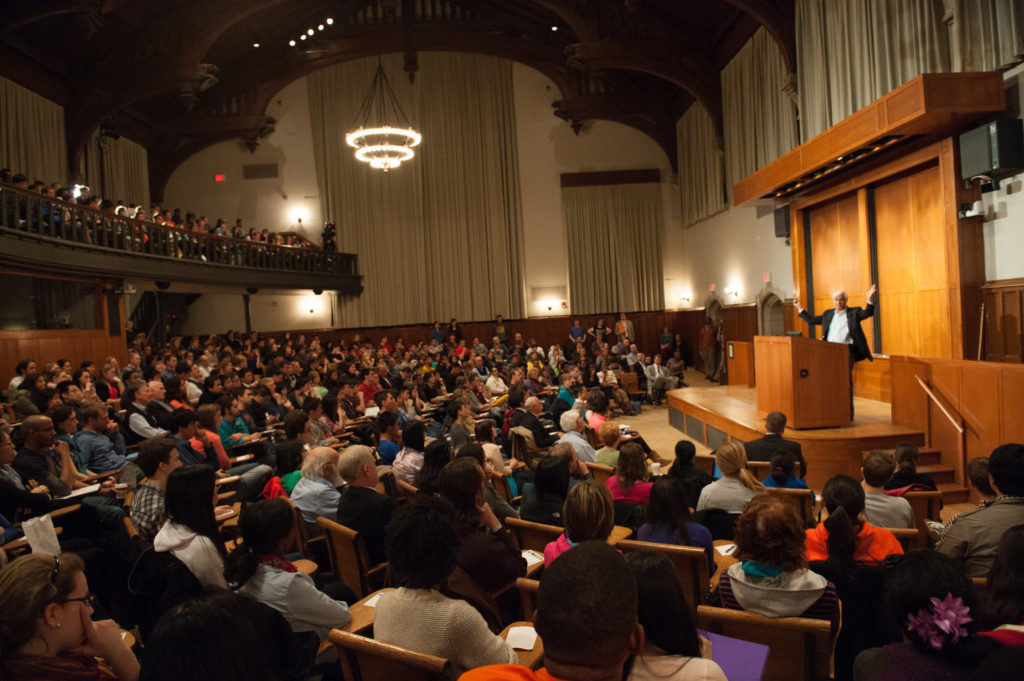
“We may hide behind the façade of our credentials but the heart of which we live cannot be hidden. So, I know how university students actually feel. I’ve been there. I’ve struggled there. And I know what you ultimately want. We chase pleasure, we chase education, we chase all these things to build a successful career. But wherever we go, our heart goes with us. And the Gospel message is the only message that reaches the heart and transforms it.”
Ravi also spoke to us about the role of the entrepreneur and why it is important for each person to find their calling before they embark on a career.
“Before one decides what they are going to do with their lives, they have to decide who they are. Otherwise, you become an existential entrepreneur, when you really need to be an essential person. So, defining who one is, is the starting point for what they are going to do. Once you define yourself as a creature of essential value created by God, then the parameters for which you will work are already set for you in the entrepreneurial zeal that you’re going to express.”
“We all need that entrepreneurial zealousness and effort. But the question is: what does God want me to do? What is the passion of my heart? That’s the first thing. What are the skills he has given me to express that passion? What is the track I must run on to take that passion and the skills and accomplish what God has asked me to do? Whatever you do, do it for the glory of God.”
He continued to provide us with more wisdom:
“Don’t do a job. Answer a call. If you do a job you can just flick from place to place and you will be self-serving all of your life. Answer a call because then you will then be serving God and serving others. A call has its door locked on the outside. A job has its door locked on the inside. If you have a job, you unlock it and walk out whenever you choose to. If I didn’t have a call, I would have left this long ago. This is not a job for me anymore.”
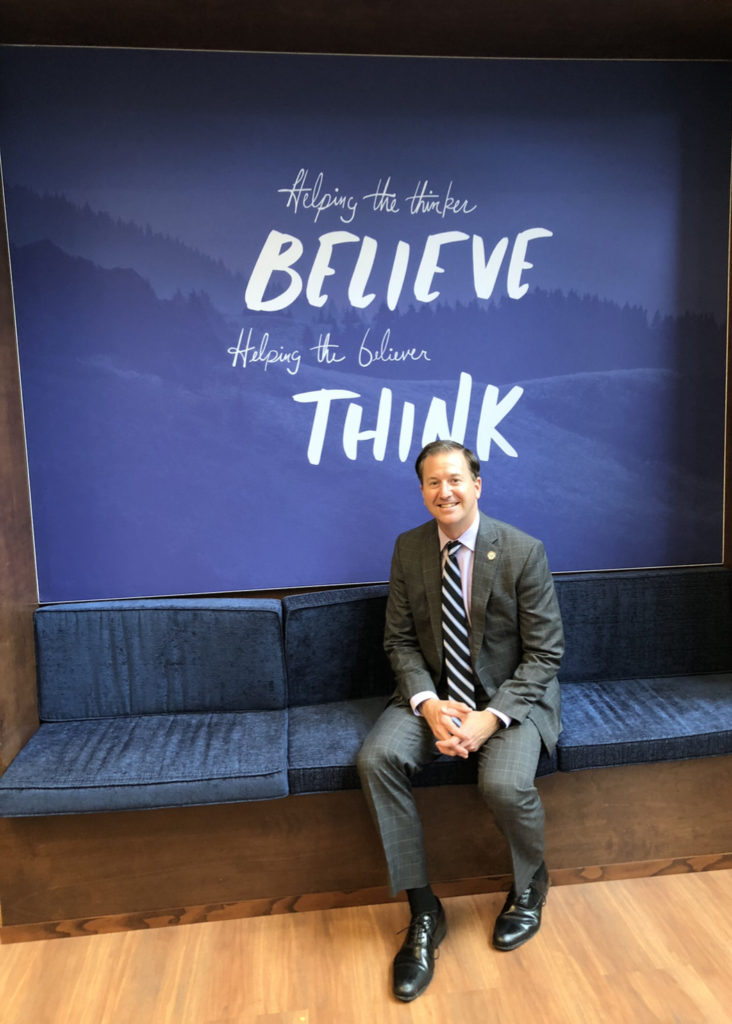
Ravi Zacharias has answered his call and has challenged us all to do the same. In addition to the great work he does leading RZIM, he is the author of 25 books, including his most recent one, The Logic of God, which is a weekly devotional to help people learn “how God thinks, the reasoning of God in the real issues of life, where thought meets action and feeling.”
You can learn more about Ravi Zacharias at rzim.org. You can also listen to the full interview with him on Episode 62 of the Agents of Innovation podcast which can be heard on Apple podcasts, Stitcher, SoundCloud, or wherever you listen to podcasts. You can also follow the podcast on Facebook, Instagram, or Twitter. We welcome your comments below and encourage you to write a review on Apple podcasts!




